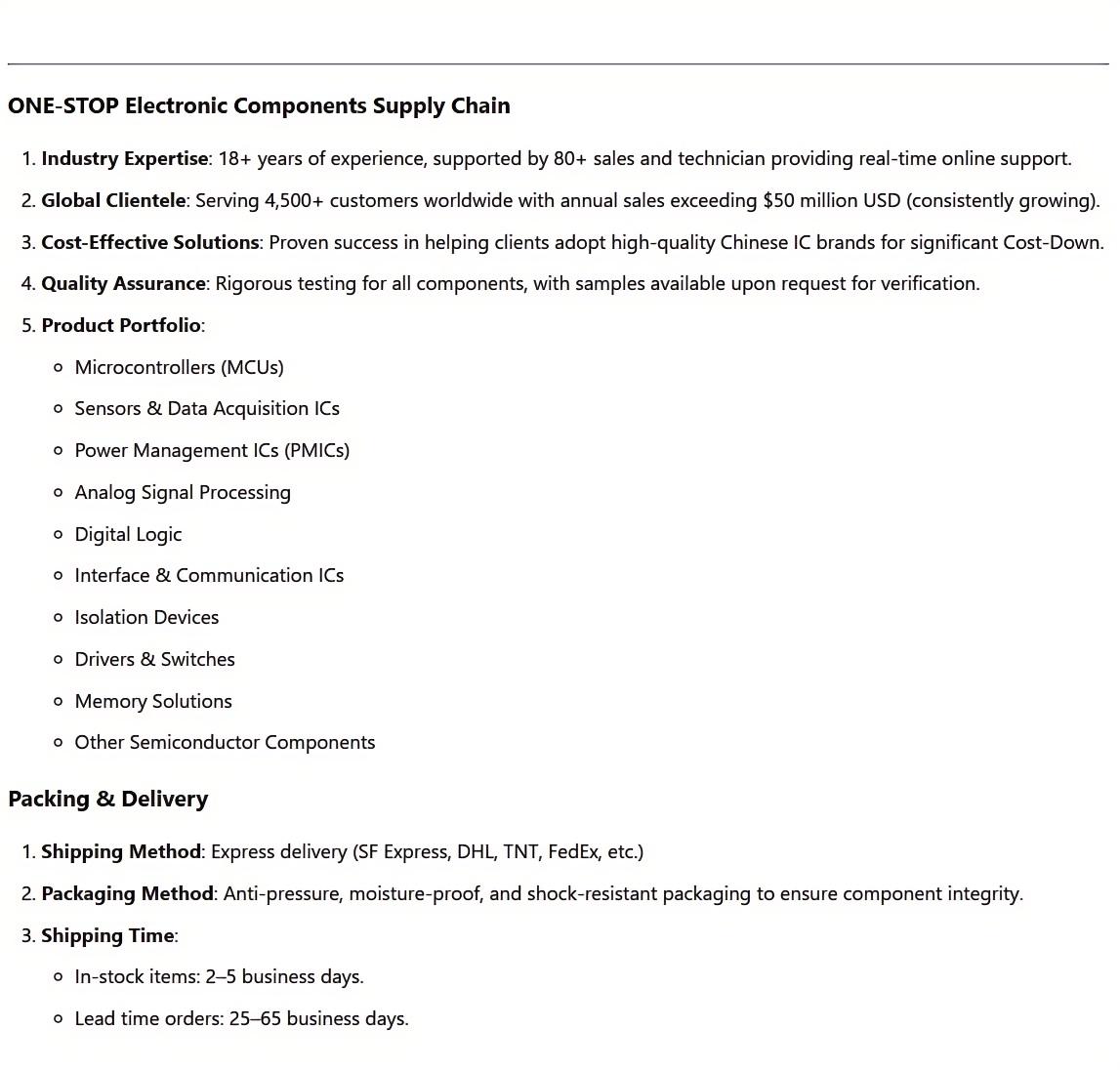GD32F303ZKT6 is a Replacement parts of
STM32F303ZDT6/MK21FN1M0AVLQ12
/MK22FN1M0AVLQ12/MK24FN1M0VLQ12
Mfr.Part No. :
GD32F303ZKT6Manufacturer :
GigaDeviceDescription :
Arm® Cortex®-M4 32-bit MCUPackaging :
TRAYPackage :
LQFP-144(20x20)Stock :
in stockPrice :
$2.5-$3.6
GD32F303ZKT6
| Price: | $2.5-$3.6 | $6.8-$9.8 |
|
Replace parts:
Replacement parts:
Alternative parts:
Pin to pin parts:
|
GD32F303ZKT6 |
STM32F303ZDT6
MK21FN1M0AVLQ12
MK22FN1M0AVLQ12
MK24FN1M0VLQ12
|
The GD32F303ZKT6 and the STM32F303ZDT6 are both built on the Arm® Cortex®-M4 core, but the GD32F303ZKT6 operates at a higher clock speed of 168 MHz, while the STM32F303ZDT6 is clocked at 72 MHz. This difference in clock speed results in significant performance improvements for the GD32F303ZKT6, enabling it to process data faster and handle more complex tasks with better responsiveness.
Additionally, the GD32F303ZKT6 offers enhanced DSP (digital signal processing) and FPU (floating-point unit) capabilities, which allow for faster mathematical and signal processing operations. The STM32F303ZDT6 does offer similar features but is limited by its lower clock speed and processing power, making the GD32F303ZKT6 the superior choice for demanding applications like real-time processing, motor control, and embedded systems with heavy computation needs.
Both the GD32F303ZKT6 and the MK21FN1M0AVLQ12 feature 512 KB Flash and 128 KB SRAM, but the GD32F303ZKT6 stands out due to its more advanced peripheral integration. The GD32F303ZKT6 includes USB 2.0 Full-Speed, CAN2.0, SPI, I2C, USART, and a 12-bit ADC with higher resolution, making it a better fit for systems requiring extensive communication interfaces and high-precision data conversion.
While the MK21FN1M0AVLQ12 also supports a similar set of peripherals, it lacks the same level of peripheral optimization and flexible integration that the GD32F303ZKT6 offers. The GD32F303ZKT6’s support for advanced low-power modes and energy-efficient designs further elevates its appeal in applications such as battery-powered devices, wearables, and IoT systems, where power consumption is a key concern.
The GD32F303ZKT6 and MK22FN1M0AVLQ12 both offer 512 KB Flash and 128 KB SRAM, but the GD32F303ZKT6 is designed for higher throughput and faster data access, benefiting from its 168 MHz clock speed. The MK22FN1M0AVLQ12, with a 120 MHz clock, offers comparable memory capacity but does not achieve the same level of processing power. As a result, the GD32F303ZKT6 outperforms the MK22FN1M0AVLQ12 in applications that require rapid data processing or high-speed communication.
The GD32F303ZKT6 is also optimized for embedded applications requiring signal processing, motor control, and advanced communications, where its high-speed operation and advanced peripherals provide an edge. On the other hand, while the MK22FN1M0AVLQ12 is competitive, it cannot match the overall system efficiency and performance of the GD32F303ZKT6 in high-demand use cases.
When comparing the GD32F303ZKT6 to the MK24FN1M0VLQ12, we see that both chips offer high memory density, with the GD32F303ZKT6 providing 512 KB Flash and 128 KB SRAM, and the MK24FN1M0VLQ12 offering 512 KB Flash and 256 KB SRAM. However, the GD32F303ZKT6 excels in overall system performance with its 168 MHz clock speed, while the MK24FN1M0VLQ12 operates at 120 MHz.
The GD32F303ZKT6 is ideal for applications requiring higher processing power, particularly in environments where real-time performance, complex algorithms, and precise control are crucial. The MK24FN1M0VLQ12, while offering good scalability in terms of memory, lacks the same level of performance and peripheral integration as the GD32F303ZKT6, limiting its application in advanced embedded systems.
One of the key advantages of the GD32F303ZKT6 over its competitors, including the STM32F303ZDT6, MK21FN1M0AVLQ12, MK22FN1M0AVLQ12, and MK24FN1M0VLQ12, is its superior cost-to-performance ratio. The GD32F303ZKT6 provides excellent performance at a more competitive price point, making it an ideal solution for high-volume manufacturing and cost-sensitive applications.
The STM32F303ZDT6 and MK21FN1M0AVLQ12 are priced higher for similar performance and features, while the MK22FN1M0AVLQ12 and MK24FN1M0VLQ12 tend to be more expensive due to their added features and higher memory capacity. However, despite offering similar or even higher specifications, these alternatives do not achieve the same level of performance or power efficiency as the GD32F303ZKT6, which offers both high performance and cost-effectiveness.
In conclusion, the GD32F303ZKT6 offers a superior combination of high clock speed (168 MHz), advanced peripherals, and energy-efficient design, making it the optimal choice for embedded systems requiring high performance, advanced signal processing, and efficient power management. Compared to the STM32F303ZDT6, MK21FN1M0AVLQ12, MK22FN1M0AVLQ12, and MK24FN1M0VLQ12, the GD32F303ZKT6 stands out in terms of overall system efficiency, cost-effectiveness, and performance.
For developers seeking a robust, versatile, and cost-effective microcontroller solution for their embedded systems, the GD32F303ZKT6 is the best choice, offering significant advantages over its competitors in terms of both performance and price.

Hot Tags :